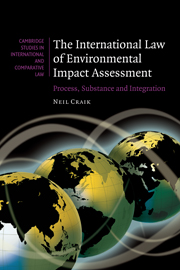Book contents
- Frontmatter
- Contents
- Acknowledgments
- Table of cases
- Table of international instruments
- Part I Introduction
- Part II Background norms
- Part III EIA commitments in international law
- Part IV The role of EIA commitments in international law
- 6 EIAs and compliance
- 7 EIAs, interests and legitimacy
- Part V Conclusion
- Appendices
- Bibliography
- Index
- Cambridge Studies in International and Comparative Law
7 - EIAs, interests and legitimacy
from Part IV - The role of EIA commitments in international law
Published online by Cambridge University Press: 05 October 2010
- Frontmatter
- Contents
- Acknowledgments
- Table of cases
- Table of international instruments
- Part I Introduction
- Part II Background norms
- Part III EIA commitments in international law
- Part IV The role of EIA commitments in international law
- 6 EIAs and compliance
- 7 EIAs, interests and legitimacy
- Part V Conclusion
- Appendices
- Bibliography
- Index
- Cambridge Studies in International and Comparative Law
Summary
Introduction
Identifying international EIA commitments as contributors to compliance suggests that EIAs can fulfill two primary functions in international environmental governance structures. In the short term, on a case-by-case basis, EIAs provide a process for facilitating the coordination of interests. Over the longer term, EIAs can have a more transformational role, shaping actor, including state, interests through the internalization of international environmental norms. These two functions are elaborated on in this chapter, with particular emphasis on the way in which internalization of international norms may occur within domestic EIA systems. Within IR scholarship, these two explanations, the first of which emphasizes interests, and the second of which emphasizes norms, as influencing state behavior, are often presented, at least as ideal types, as alternatives and in competition with one another. It is argued here with reference to EIAs that legal processes can be purposely structured to account for both material and ideational influences on actor behavior.
Not coincidentally, this distinction between EIAs as interest-coordination mechanisms and EIAs as processes by which interests may be transformed also plays out in the domestic policy context. In the context of domestic EIAs, much of the focus on the interest-transformational aspect of EIAs has tended to look at whether individual EIAs can provide opportunities for social learning. The approach taken here looks at the transformational possibilities of EIAs from a more institutional and longer-term perspective.
- Type
- Chapter
- Information
- The International Law of Environmental Impact AssessmentProcess, Substance and Integration, pp. 228 - 254Publisher: Cambridge University PressPrint publication year: 2008



